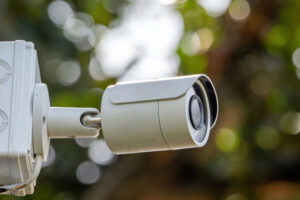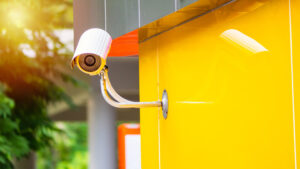What is a CCTV camera?
Cameras and monitors allow you to see live events and save footage. Closed-circuit television, or CCTV, is a surveillance system that will enable you to monitor what’s going on in and around your property. These devices were initially designed for Germans to observe the launching of the V2 rockets. Nowadays, people use CCTV cameras mainly to keep their homes safe.
How do CCTV cameras work?
CCTVs have cameras responsible for capturing and transmitting footage to the system either by cable or wirelessly. Furthermore, the way these devices work ultimately depends on how it was designed. Below are the two main types of CCTV cameras you will come across:
Analog cameras
Analog cameras capture images and transfer signals to a DVR (Digital Video Recorder) via a coaxial wire. The DVR then transforms the analog video into digital signals, compresses the information, and saves it to a hard disk.
IP cameras
On the other hand, Internet Protocol (IP) cameras provide higher-resolution pictures and greater flexibility, allowing users to email video images for review. Also, they differ from regular webcams mainly because they are stand-alone devices with their IP address, requiring a network connection to send pictures.

What are the different types of CCTV surveillance Systems?
Most of us are unaware that there are various types of CCTV cameras suited for particular circumstances or locations and that choosing the right camera for your ultimate purpose is crucial. With that being said, here are the types of CCTV cameras you can choose from:
Pan, Tilt, and Zoom (PTZ) cameras: These cameras are primarily used to monitor large open areas that require a 180- or 360-degree vision. Also, PTZs are usually installed at guard stations where active people can manage them through a remote camera controller.
Dome cameras: The form of these cameras make it impossible for outsiders to identify which way it is looking, generating a sense of ambiguity– which is a clever design feature that deters thieves. The dome camera is also one of the most popular security and surveillance cameras installed indoors and outdoors.
Bullet cameras: Bullet cameras have long, cylindrical forms that make them excellent for the outdoors. Their lenses are capable of covering long distances. Also, since they carry a distinct shape, it makes it easier for potential intruders to identify and therefore stop them from entering your home.

Box cameras: These small cameras are great for keeping an eye on more extensive areas, such as your front or back yard. To add to that, box cameras are also good at tracking small movements.
Wireless cameras: These CCTV cameras are easier to install and set up compared to wired cameras. Also, they can be powered either by batteries or AC electricity. As for the quality, wireless CCTV cameras can record high-resolution video and, if equipped with night vision, can do so at night. Some even have two-way audio capabilities, which allows you to converse with the person who is being watched by the camera.
Automatic Number Plate Recognition (ANRP) cameras: ANPR cameras help keep properties secure by gathering necessary information, particularly in high-traffic places. Specifically, they are helpful in reading and storing registration plates.
Thermal cameras: Finally, thermal cameras are among the most installed security devices in airports, malls, and other highly visited infrastructures. Other than being capable of detecting movement at any time of day, these cameras can also monitor up to 300 meters of coverage.
As you can tell, CCTV cameras are available in various forms, sizes, styles, and setups and are meant to serve a variety of objectives. Therefore, in choosing which type is best for you, make sure you have established your ultimate purpose.
Why do I need CCTV cameras?
Increased security: Most home and building owners purchase CCTV cameras primarily to deter crime. These devices instantly intimidate intruders and therefore help them stay away from entering your property. Also, when crime unfortunately occurs in and around your property, security cameras will make it easier for police to carry out their investigations.
More peace of mind: When you have security cameras installed in your home, you sleep peacefully because you know someone is watching your property for you. They are also useful when you go on long vacations since they can help you monitor your home while you are away.
Lower insurance payments: Installing a high-quality surveillance system will help you save money on insurance. In fact, some insurance companies offer discounts of up to 20% if you have them inside your property. Most importantly, if something does go wrong, having the accident videotaped can help with insurance claims since it offers proof to back up the claim.
Safeguard against fires: Specific surveillance systems, such as thermal cameras, can help you avoid fires from destroying your home or office. Also, if you constantly monitor your systems, you can immediately call for help once you have spotted fire or smoke.
Better business reputation: Installing security systems will improve your client’s overall impression of your establishment by demonstrating that you care about their safety and well-being. On the other hand, it shows that you are implementing workplace security best practices to your workers or business partners.
Work productivity: Lastly, CCTV cameras can also help you monitor your employees. Therefore, the job or supervision can be lifted off from managers. In return, they can focus on more important tasks.

